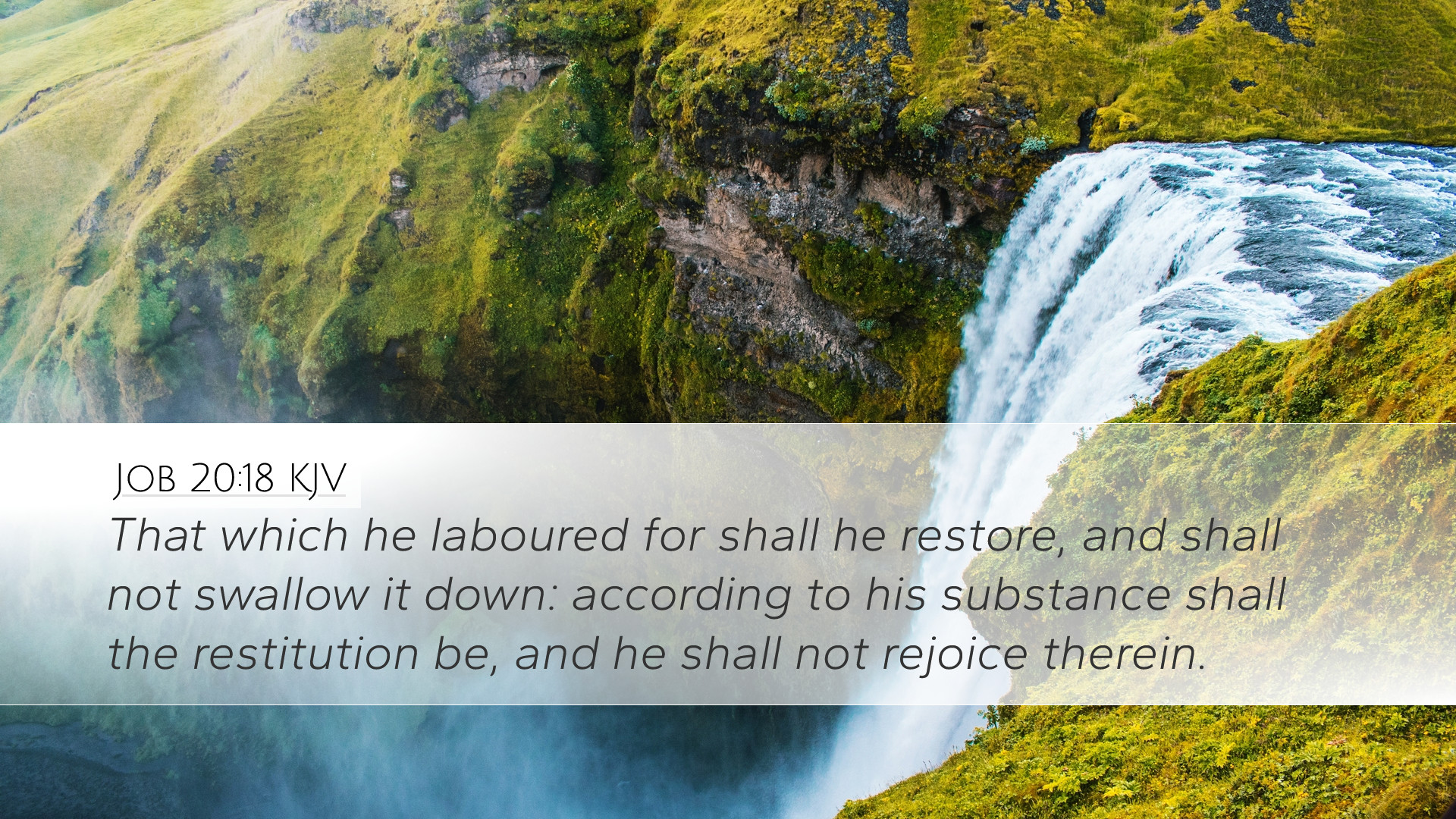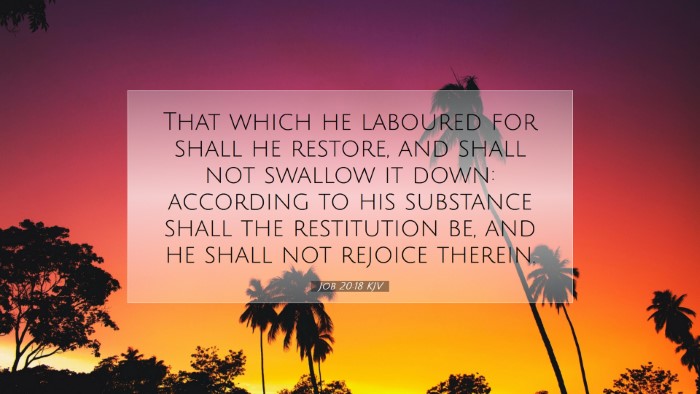Old Testament
Genesis Exodus Leviticus Numbers Deuteronomy Joshua Judges Ruth 1 Samuel 2 Samuel 1 Kings 2 Kings 1 Chronicles 2 Chronicles Ezra Nehemiah Esther Job Psalms Proverbs Ecclesiastes Song of Solomon Isaiah Jeremiah Lamentations Ezekiel Daniel Hosea Joel Amos Obadiah Jonah Micah Nahum Habakkuk Zephaniah Haggai Zechariah MalachiJob 20:18
Job 20:18 KJV
That which he laboured for shall he restore, and shall not swallow it down: according to his substance shall the restitution be, and he shall not rejoice therein.
Job 20:18 Bible Commentary
Commentary on Job 20:18
Job 20:18 states:
"He shall restore that which he took by violence, and shall not swallow it down: according to his substance shall the restitution be."
This verse is a portion of Zophar the Naamathite's response to Job, reflecting the broader themes of retribution and justice that permeate the Book of Job. Here, we will analyze this verse drawing insights from reputable public domain commentaries, including those by Matthew Henry, Albert Barnes, and Adam Clarke.
Understanding the Context
The Book of Job is a profound exploration of suffering, justice, and the nature of God. Job, a righteous man, experiences intense suffering, prompting discussions about divine justice among friends. Zophar’s speech in Job 20 addresses the fate of the wicked, positing that their prosperity is fleeting and that true justice will prevail, which includes the concept of restitution.
Insights from Public Domain Commentaries
Matthew Henry's Commentary
Restitution of the Wicked: Henry elaborates on the significance of restitution in this verse. He posits that Zophar believes the wicked, despite their short-lived success, will ultimately be made to restore what they have taken by unjust means. The idea of 'restoration' here underscores the moral order of the universe; that true justice is inevitable.
The Seriousness of Divine Justice: Henry emphasizes that the wicked may seem to prosper, but their downfall is sure. He suggests that despite their current abundance, a divine reckoning is in their future. God orchestrates moral balances in life, which may not be immediately apparent, but are ultimately fulfilled.
Albert Barnes Commentary
The Fate of the Wicked: Barnes points out that Zophar's declaration is a vital assertion about the nature of God's justice - that no wicked act will go unpunished. He notes, "He shall restore that which he took by violence," inferring that true justice requires the return of ill-gotten gains as a part of divine retribution.
A Broader Application: This commentary also invites readers to consider how often the wicked might exploit others, only to find that their deeds result in eventual calamity. Barnes emphasizes divine integrity in judgement, suggesting that God will ensure that the scales are balanced in the end.
Adam Clarke's Exposition
Divine Providence: Adam Clarke brings a theological perspective, illustrating how God’s providence governs the world. Clarke argues that the restitution mentioned implies a divine principle: whatever is obtained through unrighteous means must be returned, echoing the foundational biblical principle of justice and equity.
Echoes of the Law: Clarke additionally draws parallels to the Mosaic Law, where restitution is vital for societal order and justice (Exodus 22:1-15). The principle undergirding the law emphasizes that theft and deceit cannot stand before justice.
Theological Implications
Job 20:18 hence reveals essential theological truths about God’s nature: His justice is both inevitable and restorative. The implications of this verse serve as a reminder to readers — particularly theologians and pastors — to uphold the belief that God acts justly and that there will be a divine rectification in the end.
Practical Applications for Today
- Encouragement in Suffering: For those experiencing injustice, this verse is a powerful encouragement that God sees and will rectify wrongs.
- Moral Integrity: This passage urges individuals to examine their actions, ensuring that they align with God’s principles of justice and honesty.
- Hope for Justice: Pastors and students of the Bible can use this verse to instill hope that righteousness, though challenged, will ultimately prevail.
Conclusion
Job 20:18, through the perspectives of celebrated commentators, reveals insights about divine justice, the fate of the wicked, and the moral obligations of humanity. For ministers, scholars, and students of Scripture, this verse stands as a focal point of reflection on the nature of God, His justice, and the implications these truths have on human conduct and societal structure.


